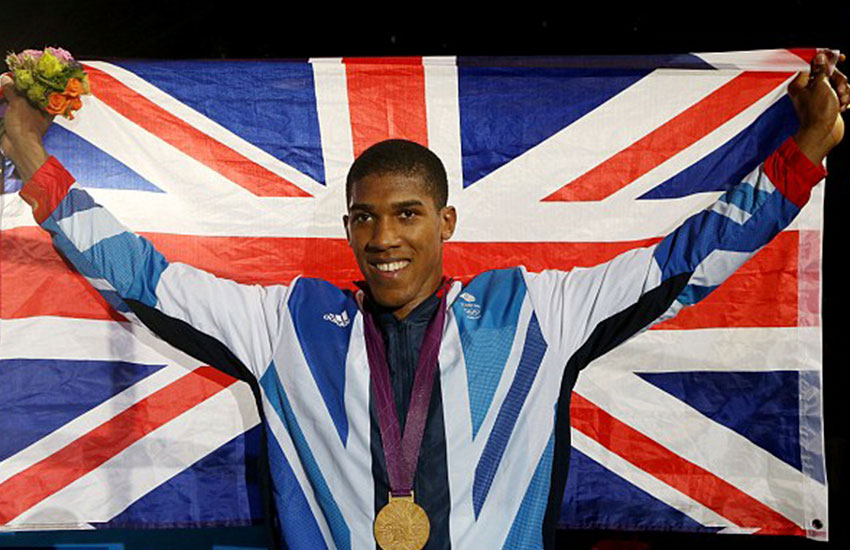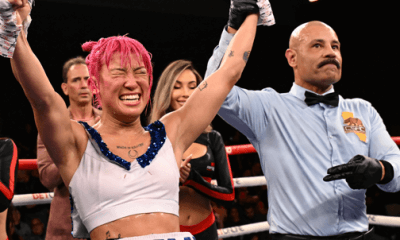Canada and USA
London Prize Ring Rules: Regaining a Lost Empire

Forget Brexit.
A lost Empire is now regained.
The Revolutionary War avenged.
It might be hard to fathom today in the land of Donald J. Trump and Deontay Wilder, but boxing’s bloody roots are firmly planted in the old country; England to be exact and London in particular. It was there in 1865, during our bloody Civil War here over the future of slavery, that John Douglas, the 9th Marquess of Queensberry, vociferously promoted a civilized set of rules for prizefighting written by an experienced Welsh sportsman named John Graham Chambers.
The ten-count for a downed fighter was introduced along with other practicalities that are easily taken for granted today such as the standardized three minute round, a minute rest between said rounds, and the notion that a boxer is considered to be knocked down (and must not be struck by a ‘fairly sized’ gloved fist) if he’s on one knee or otherwise helpless upon the ropes.
For a more contemporary comparison to pugilism’s evolution, consider the rule changes enacted by the Ultimate Fighting Championship following its early years as a no-holds-barred blood spectacle. Weight classes were adopted. Many previously common tactics such as groin-punching and hair-pulling were outlawed. Legally striking your opponent in the UFC became as tightly controlled as a lineman sacking a quarterback in the modern day NFL.
Welcome to the kinder, more gentle world of American sports where Sir Anthony Joshua is the Heavyweight King we’ve not yet been visited by, while fortuitous U.K. boxing fans are the loyal subjects of a fighting renaissance. Nearly a dozen boxers of British descent now hold world titles in the sport, a sure sign of the United Kingdom’s reclamation of the Sweet Science; a pastime that began there in 1719 with James Figg and now reigns there in 2017 with the likes of Scott Quigg. All that is to say nothing of the successes enjoyed recently by former world champions Tyson Fury, Amir Khan, Carl Frampton, Kell Brook and Tony “The Bomber” Bellew.
Britannia again rules fistiana.
It wasn’t always like this.
British boxing was once associated with lovable losers like “Our ‘Enry” Henry Cooper and the chinless Frank Bruno. Gallantry in defeat used to be good enough against the Yanks. The biggest fights in the world happened in the United States, not the United Kingdom. Something changed forever in the psyche of a whole generation when brash British welterweight title challenger Lloyd Honeyghan trashed American pound-for-pound star Donald Curry in 1986.
The net result of all that growth?
Nigel Benn. The career of Lennox Lewis. Epic super middleweight battles in Birmingham. Ninety thousand paying fans at Wembley Stadium in London for Joshua’s historic conquest of Wladimir Klitschko. The simple fact that no domestic level up-and-comer need now concern himself with “making it” in the U.S. of A. before first succeeding at home in Manchester or Sheffield etc.
Old roles have been reversed by force. An aspiring American boxer’s prospects are more limited by geography than ever before with roads to the top now leading back to the Union Jack rather than through defunct proving grounds like Philadelphia, New York, and Atlantic City.
At the top of this revival is the aforementioned Joshua (pictured after winning gold at the 2012 Olympics), the new World’s Heavyweight Champion; a man who stands literally head and shoulders above normal men. It’s impossible to understate how valuable a player Joshua is in reshaping London as the modern epicenter of boxing. Once the near-exclusive domain of Americans, Joshua owns the most important title in combat sports, and all without having yet fought a single one of his bouts in the United States. Simply put, Joshua is boxing’s main event with a stacked undercard of countrymen below him.
“I’m only going to be myself,” insists A.J.
That’s already more than enough champ.
Promoter Eddie Hearn of Matchbox Sport sees the big picture. “Anthony Joshua is the biggest star in boxing,” Hearn says. “And now we have a position with Showtime where we will move forward together in a multi-fight deal which we hope will not be five, six, or seven fights. We hope it will be for the entire career of Anthony Joshua, for the unification of the heavyweight division. And as I have I said, the birth and the evolution of the biggest star in world boxing today.”
In the super middleweight division, no less than three British boxers currently hold some form of the world championship. James DeGale holds the IBF version, George Groves and Chris Eubank Jr. the WBA and IBO respectively. This all bodes well for future unification matchups, especially given the brave history of British warfare in the popular 168-pound weight class. In America, we yearn for a return to the “Big Four” of Leonard, Hagler, Duran, and Hearns. For our counterparts across the pond, it’s a return to the glory days of Benn, Eubank, Watson and Collins they surely crave. Who do you suppose gets their nostalgic wishes filled first?
American Andre Ward holds the world light heavyweight championship but Welshman Nathan Cleverly would probably dispute that claim. Cleverly owns the regular version of the WBA 175-pound title. Most likely for ‘Clev’ is a fight with Badou Jack on the Mayweather-McGregor undercard. Win that and a corker at home against BBBofC titist Frank Buglioni may await.
The middleweight world title picture will be much less muddled after Gennady Golovkin tangles with Canelo Alvarez on September 16 in Las Vegas. American boxing still has the ‘City of Sin’ going for it—if little else. But don’t tell any of that to WBO middleweight champion Billy Joe Saunders. The undefeated Brit holds a 2014 victory over Chris Eubank Jr. and has a date in London with American Philly fighter Willie Monroe Jr. on the same day as Golovkin-Canelo. For what it’s worth, Saunders won his crown in Manchester and has defended it once in Scotland.
Terry Flanagan has defended the WBO lightweight championship five times in the United Kingdom after winning it there in 2015. The undefeated 28-year-old southpaw was supposed to put his title on the line against top prospect Felix Verdejo before a leg injury postponed the title bout that was scheduled to be on the Saunders-Monroe Copper Box undercard in London. If Flanagan emerges from the mandatory Verdejo matchup with his title intact, the sky’s the limit.
Down at featherweight, Lee Selby wears the IBF 126 pound title, stopping Evgeny Gradovich two years ago in London at the O2. With three defenses of a world title now under his belt, Selby looks like an appealing option for Carl Frampton, Leo Santa Cruz, or even Gary Russell Jr.
Bantamweight is currently home to two world title claimants from the United Kingdom. Jamie McDonnell has the WBA strap while Ryan Burnett is the new IBF champ after a recent win over Lee Haskins in Belfast to move the belt from one British waist onto another. McDonnell has five defenses of his title with two of them coming in Texas against Japanese star Tomoki Kameda. Options are considerably more limited for smaller fighters so if all else fails, McDonnell and Burnett can always throw down in a British ring for the unification of their two titles.
And last but not least, there’s Khalid Yafai, the new WBA super flyweight champion from Birmingham. A decorated amateur boxer, Yafai reminds this writer of a young Amir Khan. Of Yemeni descent, Yafai represented the U.K. at the 2008 Olympics in Beijing before going pro in 2012. At 22-0, Yafai now represents Birmingham as its first ever boxing world champion.
If all that wasn’t enough to prove the point that British boxing is presently the best in the world, the small island nation is also home to a slew of other popular pros and talented prospects.
To wit:
Callum Smith is an unbeaten super middleweight contender ready to mix it up with the elite (see above) in the traditionally British weight class. Josh Warrington is an unbeaten featherweight with a recent win over Kiko Martinez for a WBC international title. Selby-Warrington seems like a natural. Liam Smith was in over his head against Canelo Alvarez last year in Texas but the former WBO super welterweight champion from Liverpool is a very popular local attraction.
Speaking of drawing power, ‘Hayemaker’ David Haye can still put butts in seats with his big mouth and heavyweight punching power. A London rematch with Tony Bellew at the O2 would be another big-time British boxing success. Haye won’t ever be the champ but he’s no chump.
Andrew Selby, 28-year-old younger brother of IBF featherweight champion Lee Selby, looks like the next prospect/contender to make the leap to a world title. Just 9-0 (5) at flyweight, the accomplished amateur came up empty handed at the 2012 Summer Olympics in London but now hopes to join his big brother as a reigning world champion Selby from Wales.
British boxers are in the right place—at the right time.
To comment on this article at The Fight Forum, CLICK HERE.
Check out more boxing news on video at The Boxing Channel.
-

 Featured Articles4 weeks ago
Featured Articles4 weeks agoThe Hauser Report: Zayas-Garcia, Pacquiao, Usyk, and the NYSAC
-

 Featured Articles3 weeks ago
Featured Articles3 weeks agoOscar Duarte and Regis Prograis Prevail on an Action-Packed Fight Card in Chicago
-

 Featured Articles2 weeks ago
Featured Articles2 weeks agoThe Hauser Report: Cinematic and Literary Notes
-

 Book Review2 weeks ago
Book Review2 weeks agoMark Kriegel’s New Book About Mike Tyson is a Must-Read
-

 Featured Articles4 weeks ago
Featured Articles4 weeks agoRemembering Dwight Muhammad Qawi (1953-2025) and his Triumphant Return to Prison
-

 Featured Articles7 days ago
Featured Articles7 days agoMoses Itauma Continues his Rapid Rise; Steamrolls Dillian Whyte in Riyadh
-

 Featured Articles3 weeks ago
Featured Articles3 weeks agoRahaman Ali (1943-2025)
-

 Featured Articles3 weeks ago
Featured Articles3 weeks agoTop Rank Boxing is in Limbo, but that Hasn’t Benched Robert Garcia’s Up-and-Comers


















